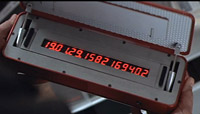Tuesday 8 March, 2011, 19:22 - Radio Randomness
Posted by Administrator
Posted by Administrator
 The front page of London's Metro newspaper today screams about 'Terror Fears over Dangerous Sat Nav Flaw'. The story highlights the extent to which the British economy relies on satellite navigation systems and claims that over GBP94 billion of domestic output would be affected by a loss of GPS caused, for example, through deliberate jamming. Not wishing to blow the Wireless Waffle trumpet (actually we have a flumpet not a trumpet), but we raised the issue of GPS jamming in February last year!
The front page of London's Metro newspaper today screams about 'Terror Fears over Dangerous Sat Nav Flaw'. The story highlights the extent to which the British economy relies on satellite navigation systems and claims that over GBP94 billion of domestic output would be affected by a loss of GPS caused, for example, through deliberate jamming. Not wishing to blow the Wireless Waffle trumpet (actually we have a flumpet not a trumpet), but we raised the issue of GPS jamming in February last year! What the article does not explain is why the loss of GPS would cause so much damage. Clearly if aircraft or boats lose GPS, they rely on their other safety devices such as radars and navigation beacons.
The crux to the problem is not in cases where GPS is used for its location abilities, but for its timing. Few people realise that, as well as providing accurate information to help you figure out where you are, GPS (and the other systems which do the same such as the European Galileo and Russian COMPASS satellites) also provides very accurate time. Each satellite has its own very accurate atomic clock on-board - in fact because of the way in which these satellites (collectively known as the Global Navigation Satellite Service or GNSS) work, accurate time is a prerequisite for determining accurate location. To work out where you are, you determine the apparent time for each of the satellites you can see. This is the 'real' time plus a delay due to the radio waves travelling from the satellite to you at the speed of light. For a GPS satellite, this delay is around 66 milliSeconds, but will vary depending on the position of the satellite in the sky relevant to you. Your GPS receiver knows where each satellite is supposed to be (this is stored in it) and thus can 'triangulate' your position using the time difference to work out how far you are from each one. Complicated eh?
This timing information is accurate to a few nanoSeconds (it has to be for you to be able to calculate your position to within a few metres) and thus can be used for other purposes, in particular for synchronising networks. No longer is the time in London different from that in Manchester as it was in the days of the railway, but the time in the two cities can be synchronised to within nanoSeconds of each other. For telecommunications and broadcast networks, this synchronisation is essential when transmitting data at speeds of Gigabits per second, where each bit is only a few nanoSeconds in duration itself. Similarly, the London Stock Exchange uses GNSS timing information to record the times of trades. And many other big businesses rely on GNSS timing of this kind. And this is the BIG problem. If the GPS signal is lost, the various network clocks will slowly drift apart and all of these networks will begin to fail.
This is, of course, a dream for terrorists. A GPS jammer can be made for a few pounds (the Metro article gets that right) and if correctly situated would cause untold havoc, though most new receivers are capable of dealing with basic jammers. In response, there are now designs for increasingly sophisticated jammers kicking around the internet and you can bet that as receivers get better at detecting jammers, the jammers will get increasingly complex. This is why the authorities are spending time and money putting in place solutions to identify jamming and locate the jammers as quickly as possible, as well as mechanisms to get around the problems of a local jamming source.
 To date there have been few real examples of malicious GPS jamming. The military did manage to 'accidentally' jam all GPS receivers in San Diego, and James Bond did have to deal with a British boat being thrown off course by a GPS encoder (in 'Tomorrow Never Dies'), but these are isolated incidents. It is certain that GPS jammers are being used today, but so far, no serious damage has been done. So if you're driving along a country lane and your Sat Nav suddenly starts indicating that you are in a car park in Coventry, you know why!
To date there have been few real examples of malicious GPS jamming. The military did manage to 'accidentally' jam all GPS receivers in San Diego, and James Bond did have to deal with a British boat being thrown off course by a GPS encoder (in 'Tomorrow Never Dies'), but these are isolated incidents. It is certain that GPS jammers are being used today, but so far, no serious damage has been done. So if you're driving along a country lane and your Sat Nav suddenly starts indicating that you are in a car park in Coventry, you know why!1 comment
( 2373 views )
| permalink
| 



 ( 3.2 / 50538 )
( 3.2 / 50538 )




 ( 3.2 / 50538 )
( 3.2 / 50538 )

